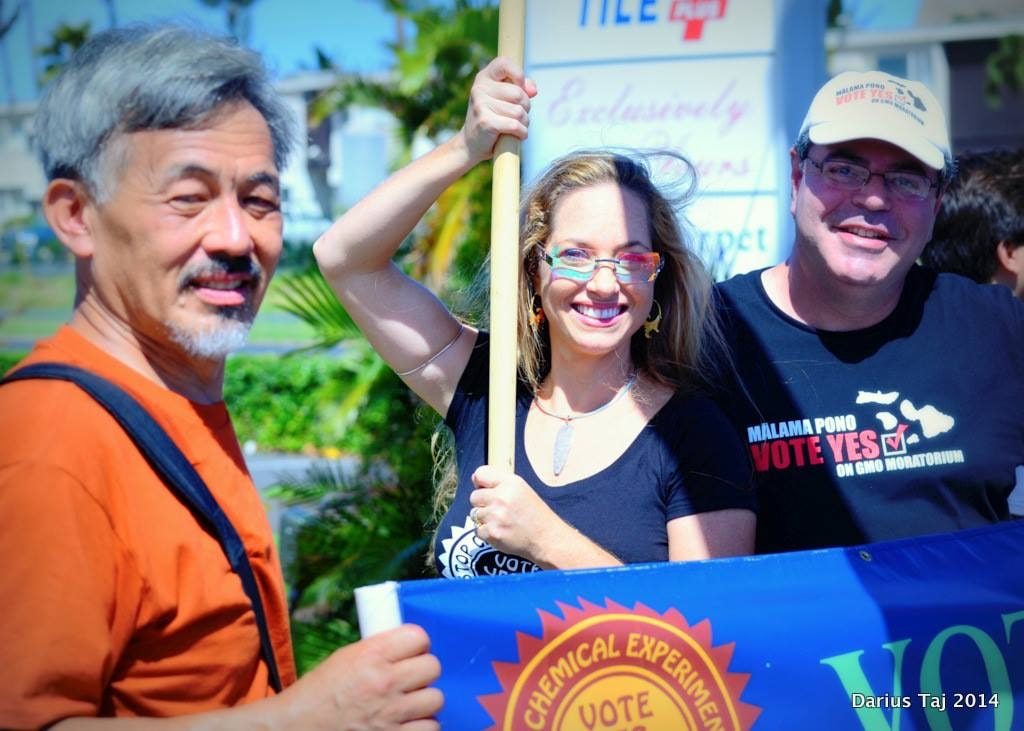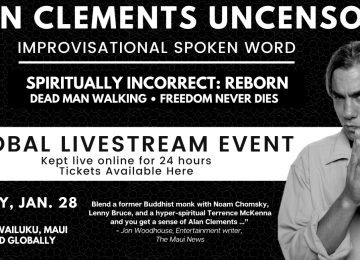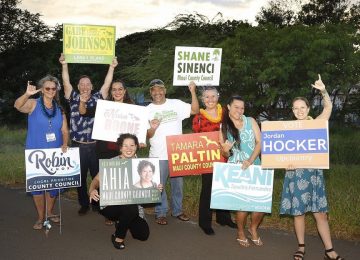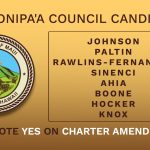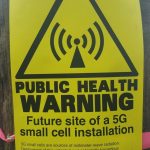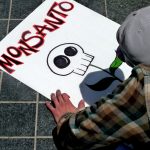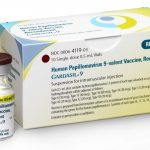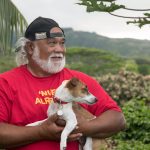Photo – Dr. Lorin Pang, Terez Amato, and Dr. Joe Ritter, credit Darius Taj
One has to wonder why Maui’s Senator Roz Baker has launched an attack on the integrity of Dr. Lorrin Pang, Maui’s District Health Officer. Baker has railed that Pang is promoting unproven treatments for COVID-19, accusing him of making “some alarming and outrageous statements,” and that the information he has espoused is “harming potentially the lives of our citizens.”
Baker is calling for Dr. Pang’s dismissal from the state Department of Health, stating, on the Senate floor, that she would ask the Board of Medicine “to review his status and to determine whether they can revoke his license.” She pronounced, “He should not be stationed in Maui,” and she even employed the derogatory term “quacks” in referring to Dr. Pang.
It is very disturbing that Baker has chosen this time to attempt to silence a respected physician who has dedicated his life to taking care of the health of Maui’s residents. Dr. Pang has been on the front line with confronting dengue fever, the spread of Zika virus, and Rat Lungworm Disease on Maui.
While she wants him dismissed from his state job and his license revoked, in an email, Baker said “I did not instigate a witch-hunt against Dr. Pang.”
What seems to have so alarmed Baker is that Dr. Pang reported in the Honolulu Star-Advertiser, he supported using hydroxychloroquine and ivermectin for treating COVID-19. In the article, he cautioned that they “need to be administered at the right time and right dosage.” In line with the FDA’s recent warning, he said, “You give the wrong thing at the wrong time, it is very dangerous.” Dr. Pang also noted that his comments were not made in his official capacity.
“If he is recommending that people take things that the FDA has said are potentially lethal if you ingest them, and that are not efficacious in treating Covid-19, then he should not be practicing medicine,” Baker told Honolulu’s Civil Beat.
Baker, House Speaker Scott Saiki, Senate President Ronald Kouchi and the chairmen of both chambers’ health committees sent a letter to Gov. David Ige on Thursday asking him to remove Pang from his official position. On Thursday the Hawaii Medical Board filed a complaint against Dr. Pang.
Dr. Pang has publicly stated, “I am not and have never been anti-vaccine. Not only am I and my family vaccinated, but I have overseen the administration of tens of thousands of shots on Maui.”
In reporting on this political firestorm, no journalist in Hawai‘i has bothered to investigate the accuracy of Baker’s statements, particularly regarding ivermectin. Instead, Civil Beat reporter Brittany Lyte chose to describe it as “a drug commonly used for deworming large farm animals, such as cows and horses. It is less commonly prescribed to people in limited doses as a parasitic.”
That description was probably surprising news to ivermetcin’s manufacturer, Merck, which distributes the drug as Mectizan. Approved by the FDA in 1996, Mectizan is used to treat River blindness. According to Merck’s website, “ivermectin has proven to be remarkably safe and effective as an anti-parasitic for humans.”
Merck has so far donated more than four billion doses of ivermetcin to human beings to prevent river blindness and other diseases in Africa and other locations where parasites are common. The company reports their “program reaches more than 300 million people in the affected areas annually.”
That’s right – Merck states 300 million people annually are safely taking ivermectin. Back in 2015, scientists William C. Campbell and Professor Satoshi Ōmura won the Nobel Prize in Physiology or Medicine for their research on ivermectin’s role in parasitic diseases.
In The Japanese Journal of Antibiotics, in March 2021, Nobel-prize winner Satoshi Ōmura and three other scientists discussed the importance of ivermectin and COVID.
They concluded: “When the effectiveness of ivermectin for the COVID-19 pandemic is confirmed with the cooperation of researchers around the world and its clinical use is achieved on a global scale, it could prove to be of great benefit to humanity. It may even turn out to be comparable to the benefits achieved from the discovery of penicillin – said to be one of the greatest discoveries of the twentieth century.”
In the summer of 2020, a group of senior doctors in India, met under the aegis of Academy of Advanced Medical Education. Evaluating ivermectin’s use in COVID-19 management, they came to the conclusion that the drug can be “a potential molecule for prophylaxis and treatment of people infected with Coronavirus, owing to its anti-viral properties coupled with effective cost, availability and good tolerability and safety.”
They reported: “Ivermectin in the dose of 12 mg BD (twice daily) alone or in combination with other therapy for 5 to 7 days may be considered as safe therapeutic option for mild moderate or severe cases of Covid-19 infection. It is cost effective especially when the other drugs are very costly and not easily available.” The Indian state of Goa announced in May it would give the drug to all its adult residents, 12 mg of Ivermectin for a period of five days as prophylaxis to protect against Covid-19. The cost in India for a complete course – less than Rs.1000 ($13).
In stark contrast, FDA-approved remdesivir costs $3,120 for a typical treatment course for those with private insurance. A study of 5,800 Veterans Health Administration patients hospitalized with Covid found no survival benefit to the patented Covid-19 treatment drug. Remdesivir is the only anti-viral fully approved for COVID–19 treatment by the FDA. The researchers suggest that the prescribed regimen (5 or 10 days) may have led to longer hospitalizations as patients finished the treatment course. Side effects include nausea, constipation, pain, bleeding, and bruising of the skin.
The World Health Organization does not recommend remdesivir for COVID. Ivermectin is included on the WHO’s Model List of Essential Medicines.
According to the Institute for Clinical and Economic Review, an influential nonprofit that analyzes drug pricing: “If the price is based just on the cost of making the drug, then a 10-day course of remdesivir should cost about $10.” Gilead, the manufacturer of remdesivir has received at least $70 million in taxpayer handouts to develop the drug.
Prof. Eli Schwartz, of Israel’s Center for Travel Medicine and Tropical Diseases at Sheba suggests ivermectin has been ignored as a treatment option because – “This drug will not bring any big economic profits,” and so Big Pharma doesn’t want to deal with it, he told The Jerusalem Post. In Japan, scientists at Kitasato University requested Merck conduct clinical trials early in the pandemic. The company declined.
While most media outlets have posted shocking headlines about ivermectin – “Horse deworming tablets dangerous for humans” – and highlighted clinical trials that prove ivermectin’s ineffectiveness, there have been multiple, successful small trials around the world, typically in third world nations that can’t afford to prescribe expensive medications.
There is confusion because animal and human ivermectin require very different dosages. Obviously anyone would be seriously risking to their health to take a drug in dosages designed for a horse. Cows and horses can easily weigh more than 1,000 pounds, and sometimes more than a ton. The amount of ivermectin meant for livestock (10 to 15 times the amount that a capsule approved for humans might contain) would not be suitable for humans who weigh a fraction of that.
In February, the National Institute of Health reported there is insufficient evidence to recommend either for or against the use of ivermectin for the treatment of COVID-19, making it an option for use in COVID-19. “Some clinical studies showed no benefits or worsening of disease after ivermectin use, whereas others reported shorter time to resolution of disease manifestations that were attributed to COVID-19, greater reduction in inflammatory marker levels, shorter time to viral clearance, or lower mortality rates.”
In March, the European Medicines Agency said that the available data does not support the use of Ivermectin for COVID-19 outside well-designed clinical trials.
The problem, there is no financial incentive to prove its effectiveness for COVID. Merck’s patent on ivermectin expired in 1996, though it was extended for different periods in various countries. Other companies’ ivermectin preparations are commercially available world-wide. Ivermectin is available as a generic prescription drug in the U.S.
For the FDA to allow emergency use for COVID, it would require a life-threatening situation where no standard acceptable treatment was available. But further clinical proof is unlikely, at least in the United States. According to a study by researchers from Johns Hopkins Bloomberg School of Public Health, clinical trials that support FDA approvals of new drugs have a median cost of $19 million. Because ivermectin is a long existing drug, cannot gain patent protection and can be cheaply and generically produced, meaning pharmaceutical companies have no incentive to perform any trials on the drug’s COVID-19 healing qualities. The U.S. FDA meanwhile, spends virtually nothing on running trials independent of Big Pharma.
Researchers noted in The Japanese Journal of Antibiotics, “Since it has been used so extensively, pharmaceutical companies cannot expect to earn enough money to recover invested funds, even if further development is conducted to obtain an indication for COVID-19. There is no therapeutic drug available for treatment or prevention purposes. It is hoped that ivermectin will be utilized as a countermeasure for COVID-19 as soon as possible.”
Civil Beat’s report on the controversy asserted: “Both drugs (ivermectin and hydroxychloroquine) have been widely discredited for use in fighting the effects of a Covid infection, although non-medical online communities and conservative news sites still promote them.” This writer attempted to post a comment on Civil Beat’s website shining a favorable light on positive studies, including a quote from the University of Oxford’s Professor Chris Butler. It was declined.
The Clinical Director of the University of Oxford Primary Care Clinical Trials Unit, Professor Chris Butler, has publicly reported: “It’s a well-known medicine with a good safety profile. It is already being widely used to treat COVID-19 in several countries.” Ivermectin has been shown to reduce SARS-CoV-2 replication in laboratory studies. Oxford University is conducting a large trial on ivermectin effectiveness.
Small studies have reported on ivermectin’s effectiveness in Argentina, Brazil, Israel, India, Pakistan, and Bangladesh. A study of healthcare workers in India, published in PLoS One, found, “Two-dose ivermectin prophylaxis at a dose of 300 μg/kg with a gap of 72 hours was associated with a 73% reduction of SARS-CoV-2 infection among healthcare workers for the following month. Chemoprophylaxis has relevance in the containment of pandemic.”
A non-peer reviewed study in Pakistan at the Combined Military Hospital Lahore, concluded: “early viral clearance was observed and no side effects were documented. Ivermectin is a potential addition to the standard care of treatment in COVID-19 patients.”
A Brazilian pilot trial published in Toxicology Reports found “Ivermectin is safe in patients with SARS-CoV-2, reducing symptomatology and the SARS-CoV-2 viral load. This antiviral effect appears to depend on the dose used.” The LD-50 (the standard in describing toxicity of a substance) for ivermectin (in rats) is 10 mg/kg. The dose used to treat Covid is .2 mg/kg. When prescribed in the recommended dosage, there is no toxicity.
And a peer-reviewed study of 200 patients at four Broward Health hospitals in Florida, published in CHEST Journal, concluded: “We showed that ivermectin administration was associated significantly with lower mortality among patients with COVID-19, particularly in patients with more severe pulmonary involvement.”
The Israeli study in Sheba examined 89 volunteers over the age of 18 who were diagnosed with coronavirus and staying in state-run COVID-19 hotels. Nearly 72% of volunteers treated with ivermectin tested negative for the virus by day six. In contrast, only 50% of those who received the placebo tested negative. Prof. Eli Schwartz reported, “there is almost a 100% chance that a person will be noninfectious in four to six days, which could lead to shortening isolation time for these people. This could have a huge economic and social impact.”
An Australian study in Antiviral Research Volume 178, June 2020, noted the FDA-approved drug ivermectin inhibits the replication of SARS-CoV-2 in vitro. Ivermectin is widely available due to its inclusion on the WHO model list of essential medicines. “In recent years we, along with other groups, have shown to have anti-viral activity against a broad range of viruses.”
“We found that even a single dose could essentially remove all viral RNA by 48 hours and that even at 24 hours there was a really significant reduction in it,” said Dr. Kyle Wagstaff of Australia’s Monash Biomedicine Discovery Institute. “I am excited about the prospect of Ivermectin being used as a potential drug against COVID-19,” said Dr. Leon Caly, a Senior Medical Scientist at the Victorian Infectious Diseases Reference Laboratory.
A meta-analysis of 63 studies using the most serious outcome reported showed 72% (55‑82%) improvement for early treatment, and 86% (75‑92%) for prophylaxis. Statistically significant improvements were seen for mortality, hospitalization, recovery, cases, and viral clearance.
The chairman of the Tokyo Medical Association, Dr. Haruo Ozaki, has called for the use of ivermectin for emergency use as cases surge in Japan. Dr. Ozaki said, “we are at the stage where it is okay to have the patient give an informed consent, and get permission to use it.”
Dr. Kazuhiro Nagao, a professor at Kansai University of International Studies, reported in mid-August on Nippon TV: “Our current medical condition is in an almost critical condition. For patients who are exposed to the corona virus, it is highly recommended to drink ivermectin. So far, all of my patients are good, recovering without any problems. It is a medication that should be given for mildly ill patients.”
It’s no wonder that the Wall Street Journal published an article on July 28, with the headline – “Why Is the FDA Attacking a Safe, Effective Drug?” The article noted, “Ivermectin is a promising Covid treatment and prophylaxis, but the agency is denigrating it.”
The Journal was criticized because a meta-analysis cited in the article included one study from Egypt, which was found to be fraudulent. The authors stand by their meta-analysis and have adjusting their numbers. In response, the Journal authors wrote: “the broader point stands: There’s strong evidence of ivermectin’s efficacy in treating Covid-19.”
The FDA’s neutrality when it comes to drug approval and safety is questionable. The federal agency recently rubber-stamped approval of an Alzheimer’s drug, which costs $56,000 a year. Some researchers called the decision “disgraceful,” and a “dangerous precedent.” Critics note that Aduhelm, has little data indicating its effectiveness for Alzheimer’s, and it comes with a risk of painful brain swelling. An early analysis dubbed the drug “futile.” Around 40% of people who got the approved dosage developed brain swelling. Robert Howard, a psychiatry professor at University College London, called the approval “a grave error.” Robert Howard, a psychiatry professor at University College London, called the approval “a grave error.”
Science magazine in 2018 exposed how FDA advisory committee members receive kickbacks from pharmaceutical companies, what they termed “pay-later conflicts of interest.” “Whether to approve 28 psychopharmacologic, arthritis, and cardiac or renal drugs between 2008 and 2014, Science found widespread after-the-fact payments or research support to panel members.” Of 107 physician advisers who voted on committees, 26 gained more than $100,000; and six more than $1 million in post hoc earnings or research support from the makers of drugs.
Back to the current controversy of Senator Baker’s vilification of Dr. Pang, it’s worth noting that Maui’s senator has received campaign funding from Pfizer, and there’s a history of conflict dating back to the island’s GMO moratorium.
Dr. Pang helped draft Maui’s GMO moratorium initiative and raised concerns about the possible health and environmental risks posed by GMOs. He told Amy Goodman at Democracy Now in 2014 – “We do not feel that the regulators—the EPA, FDA, USDA—nor the state have our best interests and are cautious enough with respect to health and environment.” Pang also reported, “I’m very concerned also with the results of the mixing of pesticides and herbicides in the environment and in people’s bodies. You may know the effects of each chemical individually, but each new combination could have stunning effects.”
Baker, who received funding from Syngenta and Dow Agrosciences in 2018, publicly stated that she had not taken money from Monsanto in a number of years. But she received campaign funds from Monsanto in 2008, 2009, 2010, 2011, and 2012.
In a 2018 Maui Independent article, Maui-based activist Autumn Ness noted that “Roz Baker has been the single biggest roadblock in passing any pesticide legislation. She tried to derail SB 3095 bill, which bans neurotoxic chlorpyrifos. Baker tried to eliminate important pesticide notification and disclosure provisions. “It was Roz Baker who gutted the bill,” said Ness. She added, “Senator Baker is notorious for putting the interests of corporations before the interests of the public.”
If Senator Baker was so concerned about the health of Hawaii’s citizens, why would she suggest at a community meeting in Kihei in 2016 – which addressed concerns about Monsanto’s spraying of GMO fields in the area – that dubious claim that most pesticide over-spraying is by homeowners. And then use this falsehood as a rationale for not supporting pesticide spraying buffer and disclosure bills.
Monsanto was fined $10 million for spraying a banned pesticide, methyl parathion, in 2014 in Kihei. At the 2016 meeting, Maui resident Deb Mader informed Senator Baker about Monsanto violating the labeling of Penncap-M, a nerve agent that was banned in December 2013. Mader said she had reported this, in person, to Baker back in March 2015. Originally developed by IG Farben in the 1940s, parathion is highly toxic.
In support of Dr. Pang, Mader noted, “She’s (Baker) had it in for Pang for years and disregarded the mounds of scientific evidence he provided on the negative health impacts of Monsanto and the other chemical companies open-air pesticide experiments. This is a witch hunt.”
Maui-based scientist Dr. Joe Ritter, who has a Ph.D. in Aerosol physics, gave written testimony in 2015 on the SB793 bill, which would have established mandatory reporting for pesticide use. “On Maui, nerve agents are being used by Monsanto,” he wrote. The chemical in question is called Methyl Parathion, which is an ACHE, an acetylcholinesterase inhibitor. The chemical action and poison mechanism of the nerve agent is identical in mechanism to the chemical warfare agents Sarin gas and VX gas. M-Parathion is sprayed on fields I drive by every day.”
When the shocking news broke in 2019 about Monsanto spraying a dangerous pesticide, Baker told KHON2 she was horrified. “They didn’t need to use products that had been banned. And then to have their workers go back in before the required waiting period – it’s just appalling.”
Ritter has voiced alarm about politicians attacking Dr. Pang. “I am vaccinated, and for COVID, I would prefer monoclonal antibody treatment over an off-label use of the parasite medicine while important alternative treatment studies continue,” he said. “But whether or not you trust the FDA or vaccines, it is unacceptable to have non-scientist, non-medical politicians deciding for licensed M.D.s what is or is not an acceptable off-label use. It sets a dangerous precedent.”
Ritter said he was prescribed ivermectin when he contacted scabies in a rehab hospital, and was clearly warned by his doctor about toxicity and the potential for liver damage. He continued: “Dr. Pang has stood up for our community on many issues and saved thousands of lives by working tirelessly to help Maui county get vaccinated. He is dedicated to saving lives. Don’t let corporate-sponsored politicians smear a good man’s reputation and honorable internationally recognized work on epidemics around the world simply to help their own causes.”
In response to concerns, Dr. Pang released a letter to the media, clarifying, “I am not and have never been anti-vaccine. Not only am I and my family vaccinated but I have overseen the administration of tens of thousands of shots on Maui.
“Standard therapies (in this case, oxygen, steroids, monoclonal antibodies) should be used for COVID. Ivermectin and hydroxychloroquine are medications approved for other diseases. There are clinical trials evaluating the use of these medications for COVID. I agree with the FDA that hydroxychloroquine or ivermectin could of course prove harmful.
“As vaccine breakthroughs occur we need to be prepared to treat early and late stages of illness. I don’t see how early treatment alternatives affect vaccine acceptance rates.”
In conclusion, wouldn’t we be best served by a politician who welcomes having the head of Maui’s health department open to exploring all possible avenues to help with the state’s COVID surge, rather than one who condemns a respected doctor?


